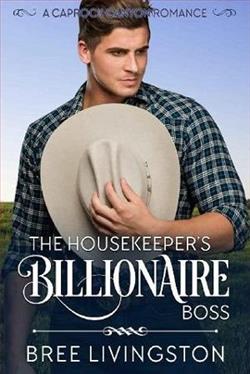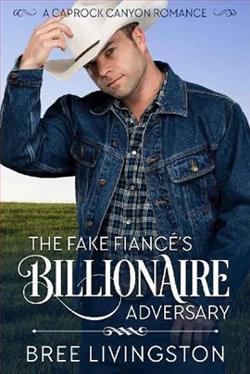Page 7 of A Calder at Heart
Joseph was silent for a long moment. “So what should I do now?” he asked.
“That’s up to you. You can talk to him and your mother or keep what you know a secret. Either way, I don’t intend to say a word. I know this is a big load for a boy to carry. But young as you are, you need to be a man about some things.”
Slowly he nodded. Then his slumped posture straightened as if he’d come to a resolution. “I’ll think about it,” he said. “Thank you, Aunt Kristin. I’m not going to cry anymore. You can go back to bed.”
Kristin stood. “I’m proud of you,” she said. “Good night, Joseph. I’ll see you in the morning.”
Deciding against the drink, she walked back to her room. Maybe she could sleep now. But she couldn’t help wondering. Had she done a good thing, giving comfort to a suffering boy? Or had she opened the door to a world of trouble?
CHAPTER THREE
TO A MAN WHO’D SPENT UNCOUNTED NIGHTS IN THE MISERY OFfreezing trenches and lying wounded on a hospital cot, the guest room in the Calder home seemed as sumptuous as the royal suite at the Ritz. But neither the mattress that cushioned his bones nor the downy quilt that warmed his body could give Logan what he craved—a simple, peaceful night’s rest.
So many changes. He lay awake, his head resting on a too-soft pillow as he gazed up into the darkness. Four months ago, after the armistice, he’d made plans for the rest of his life. The injury to his leg would end his military career and give him a modest pension. He was headed home to the family farm in Texas, where he’d left his wife, Miranda, and their two little boys in the care of his parents. They would welcome him with open arms, and he would spend the rest of his days working the land, loving his wife, and watching his children grow up. The dream of that homecoming had guided him like a beacon through the darkest days of the Great War. Soon, he’d told himself, that dream would become reality.
Instead, he had come home to an empty farmhouse and five graves in the town cemetery, marked by slabs of scrap wood bearing the names.
“It was that Spanish flu,” a neighbor had told him. “It came through here like a damned tornado, took your family and a whole lot of other folks. Those of us who didn’t die wore ourselves out diggin’ graves. We ran out of coffins and had to wrap the bodies in bedsheets. Sorry for your loss, Logan. We’d have wrote you a letter, but there wasn’t time, and we didn’t know where to send it. Your animals are at the Johnsons’ if you want ’em back.”
“Never mind the animals. Thanks.”
Numb with grief and shock, Logan had wandered through the house. His eyes had taken in the unmade beds, the clothes in the closets, his father’s old work shoes on the floor, the children’s toys, and the dirty dishes in the kitchen. Flies had buzzed in the silent space, which smelled of rot and death.
Logan had found a jug of kerosene in the shed, splashed it over the walls of the house, and lit a match. As the place went up in flames, he’d walked away, climbed into the Model T five-passenger touring car he’d bought for the drive home, and headed back to Fort Worth. On the way, he’d noticed the oil rigs sprouting like weeds in his neighbors’ fields.
He’d stayed in Fort Worth long enough to settle his family’s affairs and to track down someone who knew how to find his Calder relatives in Montana. His telegram to Webb Calder had received a welcoming answer. There was plenty of land for sale, and Logan was welcome to come and start a new life.
The auction of the mineral rights to his oil-rich acreage, including royalties, had left Logan wealthy. He’d paid for a fine granite headstone to mark the graves of his family. Then he had banked the rest of the money and set out driving to Montana, with several letters to deliver. Along the way, he had spooled out his grief until it became as hard and bitter as tar on an icy winter day, its blackness filling the deepest hollows of his heart.
And now he was here, with some life-changing decisions to make. Webb had already picked out a choice land parcel for him to buy. Logan had yet to see it. But what if it wasn’t suitable for him? Should he feel obligated to go along with Webb’s choice?
Webb Calder was one of the most powerful ranchers in the state of Montana—but to gain and hold that kind of power called for a measure of ruthlessness. Webb would do whatever was best for himself and his legacy. Logan had gathered that much from tonight’s conversation over dinner—which reminded him of another decision to be made.
That morning, he’d delivered Axel Anderson’s final letter to the young man’s parents in Blue Moon. He could still picture their faces as he described the fine soldier Axel had been and how he’d died bravely, charging out of the trench to meet the enemy. When Logan had told them how he’d visited their son’s grave in France, Lars and Inga Anderson had barely been able to contain their emotion. They had thanked him profusely, embraced him, and even invited him to stay for lunch, an invitation Logan had declined.
And now Webb Calder was counting on him to go back to these good people and talk them into selling him their land—land that would end up belonging to the Triple C Ranch.
Logan faced a painful choice—betray the people who trusted him or defy a powerful ally—an ally who was testing him, to see whether he could be controlled.
But he already knew what that choice would be. There was no way his conscience would let him take advantage of the Andersons. It was time to draw lines, even if it meant losing his cousin’s support.
As he lay pondering, an image rose in his memory. A slim, dark-haired woman in riding clothes, kneeling beside a grown-over mound of earth. He remembered the wilted bouquet and the sorrow in her eyes. Kristin Dollarhide. The name came back to him.Dr.Kristin Dollarhide.
Tragic, fierce, and hauntingly beautiful. He wouldn’t mind knowing more about her. But he was still mourning his family. And right now, he had more pressing concerns on his mind.
What was it she’d said about the grave and the young man who was buried there? Now he remembered, and he understood why the Andersons would never sell their land. Not even to him.
* * *
The next morning, after an early breakfast, the two men saddled horses and rode out to view the parcel that Webb had chosen for Logan to buy. The dawn air was fresh and cool, a fiery sunrise fading in the east. A flock of wild geese rose from a distant field, trailing into a long V formation as they swung northward. A meadowlark warbled from a solitary fence post that was all that remained of an immigrant’s deserted farm.
The prairie was like a sea, with waves of yellow grass rippling all the way to the foothills. The deep-rooted native grasses had been lost to wheat farming here. But the newer, less nourishing growth, dotted with wildflowers in shades of yellow, orange, and violet, still made a pretty sight.
“Beautiful country.” Logan’s gaze swept up to the peaks. “It feels peaceful, something I’ve missed over the years.”
“Well, peace won’t make you any money,” Webb said. “With the war over, and not so many troops to feed, beef prices are bound to drop. But the market will survive. And that ranch land you’ll be buying should support at least a thousand head. Cows may be noisy and dirty and dumb—and they’re a lot of work. But that house where you spent last night was built on beef profits. I can sell you enough surplus animals to start your own herd.”
“What if I don’t want to raise cattle?”















